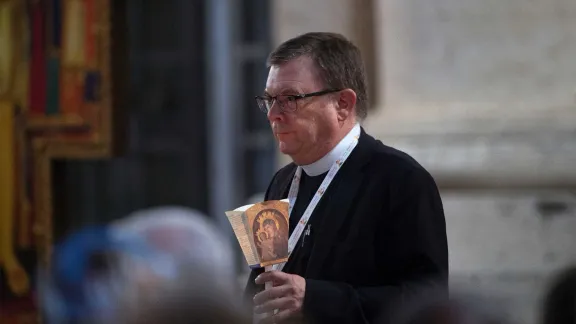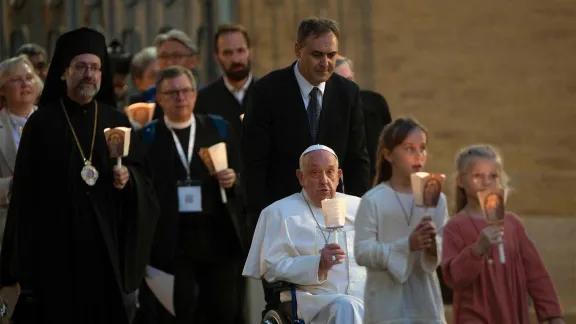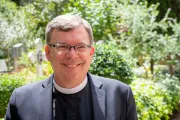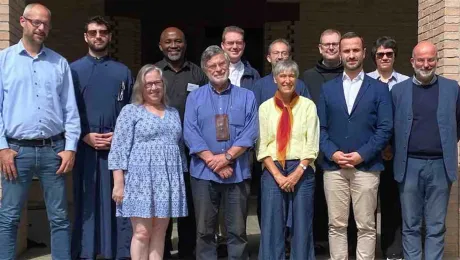
Prof. Dirk Lange holds a candle during the 11 October Ecumenical Vigil with Synod participants. Photo: CatholicPressPhoto/A. Giuliani
Reflections after the second week of the 2024 Synod of Bishops
During this second week at the Synod of Bishops in Rome – the Synod on synodality – the hard work of discernment continued in our many small groups. Table discussions were intense as we studied two chapters of the working document known as the Instrumentum Laboris. Last week, we focused on the topic of Foundations. This week the two chapters were entitled Relations and Pathways.
Firstly, how is the church relational? A very strong emphasis was placed on the Trinitarian character of church, meaning that all relations are grounded in the equal relations of Father, Son, and Holy Spirit. We are immersed in that Trinitarian relationality through baptism. Using deeply Lutheran language, we explored how the baptized are called to live out their baptism in all relationships. In the Large Catechism, Luther writes: “In baptism, therefore, every Christian has enough to study and practice all his or her life. Christians always have enough to do to believe firmly what baptism promises and brings—victory over death and the devil, forgiveness of sin, God’s grace, the entire Christ, and the Holy Spirit with his gifts.”
Rethinking relations
Rethinking relations also implies rethinking authority, since authority defines a type of relationality. How is synodal authority exercised with regard to vocations, charisms, and ministries?
Martin Luther of course had always hoped for a Council to discuss the questions he had raised. This did not happen in his time, but he did reflect on what conciliarity or synodality means and wrote about it in his treatise on the Councils and the Church.
First and foremost, it is confessing the Gospel! As Lutherans and Catholics have stated in the Joint Declaration on the Doctrine of Justification: “The doctrine of justification is measure or touchstone for the Christian faith. No teaching may contradict this criterion. In this sense, the doctrine of justification is an “indispensable criterion that constantly serves to orient all the teaching and practice of our churches to Christ” (JD 18)” (Annex to the Official Statement, §3). Synodality implies translating the Gospel in all aspects of the church’s life, including, and perhaps especially, authority.
Synodal Authority is not about power but service, obedience to God’s Word that liberates all humankind and creation. As the Instrumentum Laboris notes in paragraph 37: the ordained cannot think of themselves as individuals on whom power has been conferred but as “sharers” in the gifts. What a profound Gospel-rooted affirmation! Dietrich Bonhoeffer also pointed to this reality when he wrote that baptism does not confer a privilege upon us but commits us totally to the world, woven into a fabric of relations with our neighbors, between cultures, sharers in the many gifts of the Spirit.
Discerning pathways
In the second half of the week, we focused on Pathways. How is relationality practiced? For the Roman Catholic Church, this question requires a revision of canon law, opening up possibilities of greater participation. It requires giving context and action to the notion of the People of God and the ability for the baptized to serve in many different forms of vocation within the church.

Prof. Dirk Lange and other ecumenical delegates follow behind Pope Francis at the Ecumenical Vigil with Synod participants. Photo: CatholicPressPhoto/A. Giuliani
The dialogue was deeply respectful, recognizing the urgency and also the hesitancy. The decision-making process was discussed and clearly needs to be widened. The role of the bishop as facilitator, as the one to create a space for mutual discernment, was raised. Should the church continue in this line of inquiry and reflection, it cannot help but reimagine also the structures of what Lutherans call “the good of order.” Synodal hierarchy is an inverted hierarchy.
Friday concluded with a beautiful Ecumenical Vigil. Though Pope Francis was very tired and not able to deliver his homily, it is a powerful and visionary reflection on the journey to unity. It was distributed to everyone afterwards and can be found at this link: https://www.vatican.va/content/francesco/en/homilies/2024/documents/20241011-omelia-veglia-ecumenica.html
Despite his tiredness, Pope Francis was back at work with us in the Synod on Saturday morning. Meanwhile the week ended (or began) for me on Sunday 13 October with worship at the Christuskirche, the Lutheran parish in Rome. What a joy to be with this congregation and to be so warmly welcomed by Pastor Michael Jonas.



